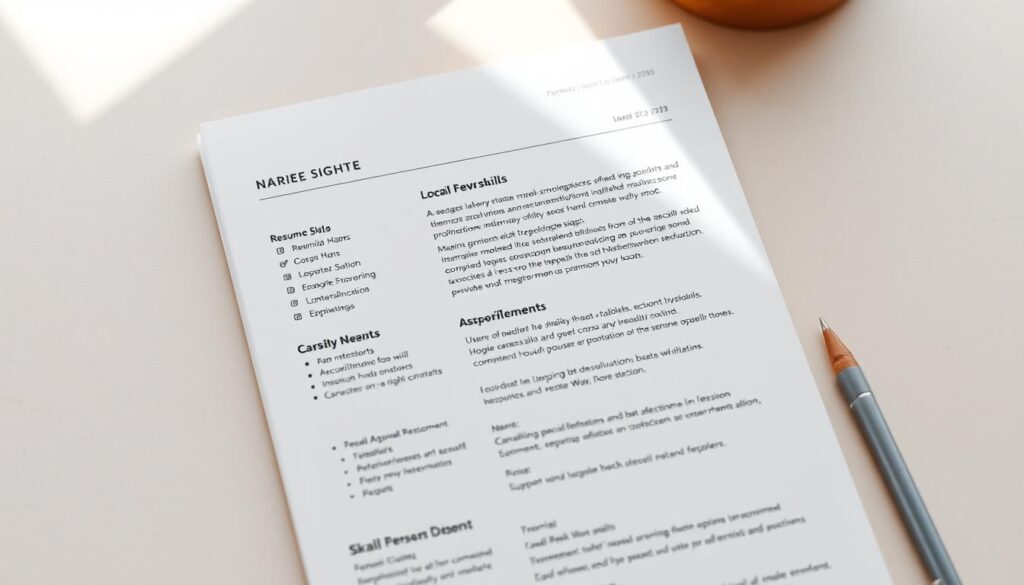You’re stepping into a competitive employment market that needs more than old ways. Today, you need smart tactics and modern tools to stand out.
A 2023 survey by the Society for Human Resource Management shows a big change. 70% of HR professionals now use AI for recruiting and selection. This means your job search must match how companies hire today.
This guide offers job search strategy advice that works today. You’ll learn job hunting techniques that mix old-school basics with new digital tools. Each method here will give you an edge and make finding your next job easier.
Success comes from mixing old principles with new data-driven methods. You’ll get tips for every part of your job search. From knowing market trends to using AI tools like RoboApply.
Key Takeaways
- Modern hiring relies heavily on AI technology, with 70% of HR professionals using automated recruiting tools
- Successful career hunting requires combining traditional methods with digital strategies
- Understanding current market trends gives you a significant competitive advantage
- AI-powered platforms can streamline and enhance your application process
- Data-driven approaches yield better results than outdated techniques
- Each stage of your career hunt benefits from specific, targeted strategies
Understanding the Job Market Landscape
Before you start looking for a job, you need to understand the current job market. It has changed a lot, with employers looking for different skills now. Knowing these changes can give you an edge and help you stand out.
Today, companies value soft skills like communication and problem-solving as much as technical skills. This is shown in LinkedIn’s 2024 Workplace Learning Report, where 92% of talent professionals say soft skills are as important as technical skills.
Getting good career advice starts with doing your homework. You need to know about the industry, what companies want, and new chances before you start applying.
Research Industry Trends
First, look at the trends in your field. Think about new tech, laws, and social changes that open up new chances. Use job search tools to keep up with these trends.
RoboApply’s job tracker shows you where jobs are and what they pay. It tells you which skills are needed most and how salaries are changing. Also, watch how companies handle remote work.
Keep your findings organized. Use spreadsheets or tracking tools to note down key industry info, skill needs, and market changes that affect your career.
Identify Key Employers
Find companies that match your career goals and values. Look for growing companies with good chances for advancement. Focus on employers that are actively hiring in your field.
RoboApply’s outreach CRM helps you keep track of important contacts at your target companies. Note their culture, growth, and recent news. This helps you tailor your applications and prepare for interviews.
Look at company sizes, funding, and market position. Startups and big companies offer different chances. Knowing this helps you choose the right companies for your career level.
Explore Emerging Fields
Find out about growing sectors due to new tech or social changes. Emerging fields often have less competition and more growth potential than old industries. Think about how your skills fit into these new areas.
Research new job titles and what they need. Many new jobs mix old skills with new tech, offering chances for career changes without starting over.
Use your research to find skill gaps and training needs. Knowing what’s needed in new fields helps you plan your career and professional growth.
Crafting a Winning Resume
Today’s resume writing must meet AI screening and human hiring needs. With 70% of HR using AI for hiring, your resume must clear AI filters first. You need a strategy and the right job search tools to succeed.
Your resume is your professional story, showing your value to employers. It must appeal to both AI and humans.

Utilizing RoboApply’s AI Resume Builder
RoboApply’s AI Resume Builder formats your content for ATS screening. It optimizes your resume for keywords and format to avoid rejection.
The AI builder analyzes job descriptions for relevant keywords. It suggests terms to include, making your application more likely to succeed. The system also provides real-time feedback on formatting issues.
RoboApply’s grammar checker removes errors that could disqualify your application. Even small mistakes can show lack of detail, making this feature crucial.
Tailoring Your Resume for Each Job
Generic resumes rarely work in today’s market. RoboApply’s tailoring features compare your resume to job descriptions and suggest adjustments. This personalization boosts your chances of passing initial screening.
The system highlights gaps between your resume and job requirements. It suggests how to reframe your experience to match employer needs. For career changers, it emphasizes transferable skills and suggests industry-specific presentation.
Effective resume writing tips focus on customization for each job. This shows genuine interest in specific roles and companies.
Highlighting Relevant Skills and Achievements
Focus on specific achievements, not just job duties. Instead of saying “managed social media accounts,” say “increased social media engagement by 45% across three platforms, resulting in 200+ new leads monthly.”
Use concrete numbers, percentages, and dollar amounts. These details help AI and hiring managers quickly see your impact and value. Quantified results stand out in both automated screening and human review.
Describe your experience with outcomes, not just activities. Highlight how your work helped team goals, company growth, or process improvements. This turns your resume into a compelling case for your candidacy.
Writing Persuasive Cover Letters
Writing a good cover letter takes thought and a personal touch that speaks to employers. It’s your chance to stand out from the crowd. Unlike your resume, it tells a story of why you’re the best fit for the job.
A well-written cover letter can make you memorable. It lets you show your personality and passion. It also shows you’re interested in the company’s mission.
Personalizing Your Cover Letter
Personalization makes your application stand out. Start by learning about the company’s latest news and achievements. This will help you write a strong opening.
Link your experience to the company’s current projects or trends. This shows you’ve done your homework. Avoid generic openings that look like they’re from a mass application.
Here’s a good example of an opening:
“I was excited to see Microsoft’s recent announcement about expanding AI accessibility tools for small businesses. This aligns with my passion for making technology accessible to everyone. As a software developer with five years of experience, I’m ready to help your team achieve more. My latest project, a voice-activated interface for the elderly, increased user engagement by 60%.”
This opening is effective because it shows you know about the company’s news. It also connects your values to the company’s mission and shows your impact.
Incorporating Keywords for ATS Optimization
Application Tracking Systems (ATS) look for keywords in cover letters before humans do. Strategic keyword placement helps your letter pass the ATS check while still sounding natural.
Find keywords in the job posting. Look for:
- Required skills and technical abilities
- Industry-specific terminology and software names
- Soft skills mentioned in the job description
- Company values and cultural keywords
Use these keywords naturally in your cover letter. Don’t force them into sentences. Professional resume tips suggest using different words for the same idea to keep your letter interesting.
For example, if the job mentions “project management,” you could say “led cross-functional teams” or “coordinated project deliverables.” This shows you have the same skill in different ways.
RoboApply’s Cover Letter Builder Features
RoboApply’s Cover Letter Builder makes personalizing your application easy while keeping it ATS-friendly. It analyzes job postings to find important keywords and suggests how to use them naturally in your letter.
Key features include:
- Company Research Integration: Pulls recent company news and achievements to help you write a personalized opening
- ATS Keyword Optimization: Highlights essential keywords from the job posting
- Industry-Specific Templates: Offers proven structures for different industries and roles
- Power Word Suggestions: Recommends impactful language that hiring managers will notice
The platform helps you structure your paragraphs well. Your opening connects with the company’s initiatives. The middle paragraphs highlight your achievements with numbers. Your closing includes a call to action that shows your enthusiasm.
RoboApply’s templates follow career coaching principles. They guide you through formulas that have helped many job seekers get interviews. The system keeps your unique voice and personality while ensuring your application looks professional.
The builder also tracks which versions of your cover letter work best. This feedback loop helps you improve your application over time.
Networking Strategically
Effective networking tactics turn job hunting into building relationships. Research shows 80% of jobs are never listed online. So, networking is key to finding these hidden jobs.
Good networking is more than just collecting cards or LinkedIn friends. It’s about making real connections that help both people. Focus on meaningful interactions, not just how many you have.

Building Connections on LinkedIn
LinkedIn is your digital hub for personal branding and making professional connections. Make your profile stand out with a good photo, catchy headline, and a detailed summary that shows what you bring to the table.
Share news and insights from your work. Instead of just commenting, add something thoughtful. This helps build your reputation and keeps you in the spotlight.
Connect with people in your field, colleagues, and leaders. When you ask to connect, explain why. This makes your requests more likely to be accepted and starts conversations.
Utilizing Professional Associations
Professional associations offer unique networking chances. They have events, job boards, and mentorship programs for your industry.
Join groups that match your field and get involved. Go to meetings, help out on committees, and write for publications. This shows you’re serious about your career and grows your network.
Many associations have job hunt resources and workshops. Use these to improve your job search.
Attending Industry Conferences
Conferences are great for meeting people in your field. Prepare your pitch and have business cards ready.
Focus on making real connections, not just asking for jobs. Listen and share your own experiences. This makes you memorable and builds strong connections.
Reach out to new contacts within 48 hours. Mention something specific from your conversation to help them remember you. Suggest ways to stay in touch or work together.
| Networking Method | Time Investment | Cost | Potential Reach | Relationship Depth |
|---|---|---|---|---|
| LinkedIn Networking | 30 minutes daily | Free to $60/month | Global | Medium |
| Professional Associations | 5-10 hours monthly | $50-$500 annually | Industry-specific | High |
| Industry Conferences | 2-3 days per event | $500-$2000 per event | Concentrated | Very High |
| Local Meetups | 2-3 hours monthly | Free to $20 | Local | High |
Networking is a two-way street. Help others by sharing jobs, making introductions, or offering insights. This strengthens your relationships and increases the chance they’ll think of you when opportunities come up.
Leveraging Job Search Platforms
Success in today’s job market means more than just browsing online. You need to use online job portals wisely. It’s about understanding their features and timing your applications right.
Apply within three days of a job posting to increase your chances. Many jobs get hundreds of applications. HR teams often look at early submissions first.
Understanding Job Boards and Their Benefits
Different job search tools have different uses. Big platforms like indeed and LinkedIn Jobs offer wide reach and filters. But, niche job boards can find you better matches for specific roles.
Tech jobs? Check out AngelList and Stack Overflow Jobs. Marketing jobs? Look at MarketingJobs.com. These sites have less competition and more targeted jobs.
| Platform Type | Best For | Application Volume | Response Rate |
|---|---|---|---|
| General Job Boards | Entry to mid-level positions | High competition | 2-5% |
| Industry-Specific Portals | Specialized roles | Moderate competition | 8-12% |
| Company Career Pages | Direct applications | Low competition | 15-20% |
| Professional Networks | Referral opportunities | Very low competition | 25-35% |
How RoboApply Tracks Job Applications
RoboApply tracks your job applications from various boards. It organizes them by status, company, and date. The auto-apply Chrome extension helps apply quickly in the first three days.
The tracker logs your applications and tracks response rates. It shows which platforms lead to more interviews. This helps you focus on the best job search tools for your field.
RoboApply’s analytics track your application-to-interview rates. You can adjust your strategy based on real data, not guesses.
Setting Up Job Alerts Effectively
Use specific keywords, locations, and company filters for job alerts. Avoid broad searches that waste your time.
Set up alerts for both your dream jobs and unexpected opportunities. Get notified right away when new jobs match your criteria.
Review and tweak your alerts weekly. Keep up with market trends and career goals. This way, you don’t miss out on new opportunities.
Preparing for Interviews
Getting ready for an interview is more than just memorizing answers. It’s about doing your homework, practicing, and showing confidence. This can make you stand out and get you closer to the job you want.
Today’s employers want to know you’ve done your homework on their company. They also like it when you share your experiences in a clear, structured way. Professional career coaching services say that’s what sets the best candidates apart.

Researching Companies Before Interviews
Start by digging deep into the company’s background. Look at their latest news, financial health, and plans for the future. Also, check out their leadership team and company culture.
Really show you care by focusing on specific areas. Learn about their new products, growth plans, and challenges. This lets you ask smart questions and show how you fit in.
Use different sources to get a full picture. Visit the company’s website, read press releases, and check out industry news. LinkedIn can give you insights into the company culture and growth chances.
Practicing Common Interview Questions
Most interviews now ask behavioral questions to see your soft skills and fit. The STAR method helps you tell stories that show your achievements.
Here’s a STAR example for interview prep:
Situation: Our team had to launch a product fast with a 30% budget cut. Task: As project manager, I had to deliver quality with less money. Action: I changed the timeline, got better deals from vendors, and trained the team to do more. I also had daily meetings to catch problems early. Result: We met the deadline, saved 5% on budget, and our product sold 25% more than expected.
Practice your answers out loud and record them. This helps you see what you need to work on. The Department of Labor’s interview tips offer more advice for all kinds of jobs.
Using RoboApply’s Interview Coach Tool
RoboApply’s Interview Coach Tool makes getting ready for interviews easier and more effective. It gives you questions specific to your industry and helps you craft answers that highlight your achievements.
The tool keeps your notes and talking points organized. This makes it easy to access important info during interviews. You can also practice answering common questions and get feedback on your delivery.
The Interview Coach Tool also tracks your progress across different companies and roles. This all-in-one approach to career coaching services prepares you for any interview and helps you adapt to different company cultures.
| Interview Preparation Component | Traditional Method | RoboApply’s Approach | Key Benefit |
|---|---|---|---|
| Company Research | Manual web searches | Organized research templates | Systematic information gathering |
| Question Practice | Generic preparation | Industry-specific questions | Targeted skill demonstration |
| Response Development | Unstructured storytelling | STAR method framework | Compelling narrative structure |
| Progress Tracking | Mental notes | Digital preparation dashboard | Measurable improvement |
Good interview prep is about doing your homework, practicing, and showing off your skills. With the right tools and strategies, you can go from being nervous to being a standout candidate.
Following Up After Interviews
What you do after an interview can make a big difference. Your follow-up strategy is key to getting hired. Job hunting techniques and career coaching services stress the importance of staying in touch.
Right after your interview, you can show you’re still interested. Interviews don’t end when you leave the room.

Best Practices for Post-Interview Emails
Your thank-you email is more than a thank you. It’s a way to stay in the interviewer’s mind. It shows you’re professional and detail-oriented.
Send your thank-you email within 24 hours of your interview. This shows you’re eager and organized.
Here’s a good email template:
Subject: Thank you for our conversation about the Marketing Manager role
Dear Sarah,
Thank you for talking about the Marketing Manager job with me yesterday. I was excited to hear about your team’s new product and how I could help.
Our talk made me even more interested in joining ABC Company. I like how you focus on data, which is also important to me. I’ve attached a case study of my work that improved lead quality by 35%.
I’m looking forward to hearing about next steps. I’m ready to give you any more info you need.
Best regards,
[Your name]
This template is good because it talks about specific things you discussed. It shows you’re a good fit. Make sure your emails are personal – generic ones don’t work well.
Timing Your Follow-Ups
When you follow up matters a lot. It shows you’re professional and not too pushy. Knowing when to follow up depends on the industry and company culture.
Here’s a table with good times to follow up:
| Follow-Up Stage | Timing | Purpose | Communication Method |
|---|---|---|---|
| Initial Thank You | Within 24 hours | Express gratitude and reinforce interest | |
| First Follow-Up | One week after thank you | Check on decision timeline | Email or phone |
| Subsequent Follow-Ups | Every two weeks | Maintain visibility without being pushy | Email preferred |
| Final Follow-Up | After stated decision date | Request status update professionally | Email with phone backup |
Avoid following up too much as it can hurt your chances. Respect the interviewer’s time and the company’s decision process.
If you haven’t heard back, wait a week before trying again. This shows you’re patient but still interested.
Using RoboApply’s Outreach CRM
Keeping track of follow-ups can be hard when you’re looking at many jobs. RoboApply’s Outreach CRM makes it easy. It helps you stay on top of things without getting overwhelmed.
The platform’s automated scheduling helps you follow up at the right times. Just set it up once, and let it work for you.
RoboApply’s Outreach CRM has many features:
- Automated follow-up scheduling based on industry best practices
- Customizable email templates for different interview scenarios
- Interview notes integration for personalized communications
- Response tracking and engagement analytics
- Multi-company pipeline management
The system suggests the best times to follow up based on your situation. For example, it might suggest more frequent follow-ups for startup jobs.
Professional career coaching services often suggest using CRM tools. RoboApply’s platform keeps your follow-up strategy consistent, no matter how many jobs you’re applying for.
“The key to successful follow-up is consistency and personalization. Technology should enhance your human touch, not replace it.”
Good follow-up is about being persistent but professional. RoboApply’s CRM helps you stay on track by giving you insights into your communication.
Building Your Online Presence
Success in today’s world depends a lot on your digital image. Your online presence is like a 24/7 representative of you. It can greatly affect your job search. Effective personal branding means being true and consistent online.
Job seekers who succeed know the importance of a strong digital footprint. They show their skills and stay true to their values. This approach helps build lasting connections and opens doors to new opportunities.
Tailoring Your LinkedIn Profile
Your LinkedIn profile should stand out. Start with a professional photo that fits your industry. Your headline should highlight what makes you unique.
Write a summary that tells your professional story with achievements and numbers. Quantifiable results speak louder than generic descriptions.
Use LinkedIn’s featured section to show off your work. This lets you demonstrate your skills with real examples.
Creating a Personal Website or Portfolio
Personal websites are for more than designers and developers. Every professional can benefit from a digital portfolio. Marketing pros can show campaign results, project managers can highlight improvements, and sales pros can show revenue growth.
Your portfolio should include detailed case studies. Share the challenges you faced, the solutions you found, and the results you got. This shows your analytical skills and focus on results.
Remember, personal branding works best when it’s true to you. Share content and create materials that show your values and skills.
Engaging in Relevant Online Communities
Being active in online communities is a key networking tactic. Join industry discussions on Reddit, Facebook groups, or forums. Focus on adding value, not just promoting yourself.
Share helpful resources, give feedback, and join meaningful conversations. Answer questions in your area of expertise and engage thoughtfully. Authentic engagement builds stronger professional relationships than self-promotion.
Use RoboApply’s outreach CRM to track your online networking. This helps you keep up with connections and make the most of your online interactions.
Continuous Learning and Skill Development
Starting a career transition means knowing your strengths and weaknesses. The job market changes fast, so learning new things is key. You need to find out where you can get better to impress employers.
Getting better at your job is more than just adding to your resume. It shows you’re eager to grow and adapt. Employers like people who keep learning and stay up-to-date with trends.
“The capacity to learn is a gift; the ability to learn is a skill; the willingness to learn is a choice.”
Identifying Gaps in Your Skill Set
First, do a skills gap analysis. Compare what you can do now with what you need for your dream job. This will show you where you need to improve.
Look at job ads in your field closely. See which skills are most important. Focus on both technical skills and soft skills that employers value.
Think about these important areas:
- Technical skills needed for your dream job
- Software skills and digital literacy
- Communication and leadership skills
- Problem-solving and analytical thinking
Online Learning Platforms to Consider
There are many online courses to improve your skills. Choose ones with practical projects and real-world examples, not just theory.
Coursera, LinkedIn Learning, and Udemy are good places to start. They offer certificates that make your resume stronger. Specialized courses from industry providers give you targeted job search strategy advice.
Choose courses that match your career goals. Look for ones that offer practical experience and help you build a portfolio. This guide to upskilling can help you pick the right path.
Make time each week to learn new things. Even a little bit every day can add up. Being consistent is more important than how much you learn at once.
How RoboApply Helps Track Learning Progress
RoboApply lets you track your learning journey. You can log courses, certifications, and new skills you’ve learned.
This info is easy to add to your resume. You can talk about your growth in interviews, showing your commitment to learning.
The platform’s tools help you keep a detailed record of your learning. This is useful for updating your profiles or reviews.
Join groups in your field to learn from others. Stay current with new trends and technologies. Continuous learning makes you ready for new challenges.
Evaluating Job Offers and Career Moves
Smart career choices need a careful look at each opportunity. Start by understanding what you really want and what you can’t live without. This honest self-check is key to making the right move.
Understanding Salary and Benefits
Before you start talking money, check out what others are making on Glassdoor and PayScale. Don’t just look at the base salary. Think about health insurance, retirement plans, and chances to grow professionally. Also, consider things like flexible hours and vacation time as part of your total pay.
Considering Company Culture
The culture of a company affects your happiness and success. Look at what current employees say on Glassdoor and see how teams work together. Ask about work-life balance, chances to move up, and how teams interact. These steps help you find a place where you’ll do your best work.
Using RoboApply in Your Decision-Making Process
RoboApply helps you keep track of all the important details. Note down salary, benefits, and what you think of the company culture. Make a scorecard that shows what matters most to you. Use it to keep up with different job offers and deadlines.
Make a list of what you love and hate about jobs. Also, write down what you absolutely need and what you can’t stand. This helps you compare jobs and choose one that fits your future plans.
FAQ
How has AI changed the job search process in 2024?
AI has changed job searching a lot. Now, 70% of HR folks use AI for hiring, says SHRM’s 2023 survey. You need to make your resume and cover letter ATS-friendly. RoboApply’s AI Resume Builder helps with this.
AI tools also help tailor your applications and track job openings. RoboApply’s Interview Coach Tool lets you practice for interviews.
What’s the most effective way to research companies before applying?
Start with RoboApply’s job tracker to watch job postings and salary trends. Look up recent news and the company’s culture. Check Glassdoor for employee feedback and the company’s social media.
Make a plan by noting company sizes and growth. Use RoboApply’s features or a spreadsheet to track this.
How should I customize my resume for each job application?
Use RoboApply’s tailoring tools to match your resume with job descriptions. Focus on achievements with numbers, like “increased social media engagement by 45%.” This makes your resume stand out.
The ATS optimizer in RoboApply ensures your resume is ATS-friendly. This helps avoid automatic rejections.
What makes a cover letter stand out in today’s competitive market?
Your cover letter should be a personal pitch that shows you know the company. Use RoboApply’s Cover Letter Builder for a personalized touch. Include keywords from the job posting.
Structure your paragraphs well. Start with a company connection, then highlight your achievements. End with a call to action. Always use numbers to show your impact.
Why is networking more important than applying to posted jobs?
Networking is key because 80% of jobs aren’t posted online. Build real connections on LinkedIn and at industry events. Use RoboApply’s outreach CRM to keep in touch.
Networking is a two-way street. Help others by sharing job tips and making introductions. This builds stronger relationships and more job leads.
How can I optimize my job search across multiple platforms?
Don’t just apply everywhere. Use RoboApply’s job tracking system to find jobs on many sites. The auto-apply Chrome extension helps you apply quickly.
Set up job alerts with specific keywords. Use RoboApply’s analytics to see how your applications are doing.
What’s the best way to prepare for behavioral interview questions?
Practice with RoboApply’s Interview Coach Tool. Use the STAR method to answer questions. Give specific examples with numbers, like “increased social media engagement by 45%.”
How soon should I follow up after an interview?
Send a thank-you email within 24 hours. Use RoboApply’s CRM to track follow-ups. Include details from the interview and restate your interest.
If you don’t hear back, follow up once a week, then every two weeks after that.
How important is having a personal website for job searching?
A personal website is crucial. It shows you’re professional 24/7. It’s not just for designers; marketers and sales pros can also benefit.
Include case studies to show your problem-solving skills. Your website should show your expertise and work impact.
What skills should I focus on developing to stay competitive?
Do a skills gap analysis to see what you need to work on. LinkedIn says 92% of talent pros value soft skills as much as technical ones. Work on communication, adaptability, and problem-solving.
Use platforms like Coursera for courses with real-world projects. This is better than just learning theory.
How should I evaluate and compare multiple job offers?
Write down what you want in a job before getting offers. Don’t just look at salary. Consider total compensation and work-life balance.
Use RoboApply’s features to organize job info. Create a scoring system based on your priorities. Think about long-term career growth and networking.
What are the most common resume mistakes that lead to automatic rejection?
Common mistakes include poor ATS formatting and not using keywords. Use RoboApply’s AI Resume Builder to fix these. Avoid generic descriptions and include specific numbers.
Grammar errors can disqualify you. Use RoboApply’s grammar checker. Customizing your resume for each job is also key.
How can I effectively transition to a new industry?
Use RoboApply’s AI builder to highlight transferable skills. Focus on universal skills like project management. Research the new industry to understand its terms and challenges.
Take courses or certifications to show you’re serious about the transition. Use your network to connect with professionals in your target industry.
What’s the best strategy for remote job searching?
Pay attention to remote work policies. Use remote work filters on job boards. Clearly state your remote work preferences in applications.
Be ready to show your remote work skills during interviews. Highlight your experience, self-motivation, and digital collaboration skills. Use RoboApply’s job tracker to find companies with good remote work cultures.


















